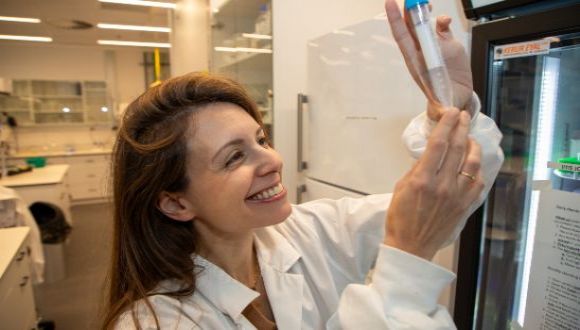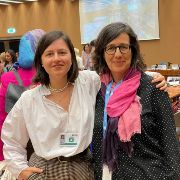Closing the Academic Gender Gap in Israel
Some 50 outstanding female TAU graduates have gone abroad for post-docs thanks to a fellowship aiming to increase women’s representation in academia
Though great progress has been made for gender equality in recent decades, academia today still struggles with a severe underrepresentation of women in senior positions. Even at Tel Aviv University, where women make up 58% of PhD students—They compose only 33% of senior faculty. To help enable women to continue in academia, the Presidential Postdoctoral Fellowship for Women is offered to outstanding female TAU graduates to assist them in going abroad for postdoctoral research. Ultimately, many of these brilliant women return to Israel and strengthen the academic landscape through their groundbreaking contributions.
Unique Obstacles
At Tel Aviv University, over 130 talented women complete their doctoral degrees each year. Generally, Israeli researchers who wish to compete for a faculty position at a top Israeli university must go abroad for their postdoctoral research, a requirement which poses particular challenges to women. “Statistics show that the post-doc stage is where the most women fall out of academia,” says Fellowship director Michal Boneh-Mizrahi. “This is true globally, but in Israel women are usually older and already have a family that they must relocate and support, creating further obstacles.”
Aside from social norms that pressure women to prioritize their husbands' careers, these obstacles are in large part financial. The monetary cost of settling in a new country and fully supporting a family (given that a post-doc’s spouse may not be able to work abroad) is often much higher than any funding given by host institutions which do not take dependents into account. “Funding for women to go abroad to do postdoctoral work should be a high priority,” says TAU Prof. Ines Zucker (Engineering), who received the TAU Fellowship while doing her postdoctoral work on nanomaterials and sustainable water treatment at Yale. “We lose so many talented women from academia because of the financial burden.”
Prof. Zucker with her lab team of student researchers (photo: Rafael Ben-Menashe, TAU).
Providing Support to Advance
Since 2016, Tel Aviv University has enabled 49 outstanding women to conduct postdoctoral research abroad with the Presidential Postdoctoral Fellowship for Women. The two-year Fellowship is offered to 5 female TAU PhD graduates each year. These researchers span a wide range of fields and have traveled to world-renowned institutions including Harvard, Oxford, MIT, Mt. Sinai Hospital and more.
“My time at Harvard was a life-changing experience, both for my career and my family,” says Fellowship recipient Dr. Yifat Naftali Ben Zion (Law), who recently returned to TAU as faculty. “I got to meet so many important people in my field and learn so much that I couldn’t have anywhere else. But it would not have been possible without the Fellowship, as I needed to bring my husband and three young children with me.”
Dr. Belaynesh Makonen (Education), another former Fellow, spent two years away from her husband and four children at University of Minnesota. “Thanks to the Fellowship, I was able to take time off from my career to accomplish my academic goals.” Dr. Makonen, who was the youngest person ever to become a school inspector in Israel, conducted post-doc research exploring American Jewish identity. She also found a place in the community herself. “I immigrated to Israel from Ethiopia when I was 15; when I got to America, I felt like I was starting over one more time. The Minnesota Jewish community welcomed me with open arms and made sure I had everything I needed.” The support was especially important after Oct. 7 as two of her sons were called to fight in the Gaza war.
Dr. Belaynesh Makonen traveled to Washington, DC with an Anti-Defamation League leadership program on fighting antisemitism.
Dr. Makonen also took on the responsibility of acting as an advocate and ambassador for Israel during her time abroad. She participated in an ADL leadership program and spoke out about her own identity. “Since I don’t look how Americans expect Israelis to look, I wanted to use my voice to show the diversity of Israel and help spread tolerance within the University of Minnesota.”
At the Forefront of Israeli Research
In addition to acting as ambassadors outside of Israel, the Presidential Fellowship ensures that these women are able to return to Israel and secure top academic positions where their groundbreaking research can have the most impact. Prof. Zucker and Dr. Naftali Ben Zion are two such women who returned to Tel Aviv University from Ivy League universities.
“I had a great time at Yale,” says Prof. Zucker. “I was exposed to the top science in my field and formed lasting professional partnerships.” Since returning to TAU, her lab has become the first in the world to research microplastics and other byproducts of industry in the environment rather than controlled lab conditions; their methods are now used internationally. Her other projects also continue to focus on removal of pollutants from water in affiliation with the TAU Environmental School and the Jan Koum Center for Nanoscience and Nanotechnology.
Prof. Naftali Ben Zion researches financial law at Tel Aviv University's Law Faculty (Photo: Rafael Ben Menashe, TAU).
“I feel very at home here,” says Prof. Zucker, who received all three of her degrees from Tel Aviv University. “I especially appreciate that the schools are set up to encourage collaboration, allowing for incredibly diverse applications of my research.”
“The greatest strength of Israeli universities and TAU specifically is our community,” agrees Prof. Naftali Ben Zion, who researches private law with a specialization in fiduciary law, or the legal framework governing the responsibilities of those entrusted with managing others’ interest. This field of law is relatively unexplored in Israel, and her work has already been cited by the Israeli Supreme Court.
“There's such a unique amount of support and cooperation here, which creates better academic work. The sharing and mutual development of ideas are the foundation of strong academia.”






